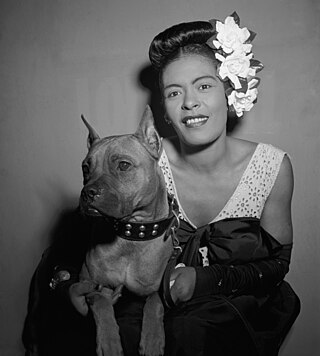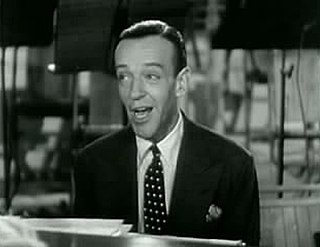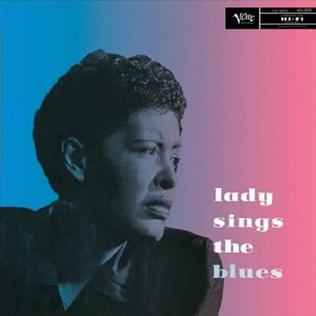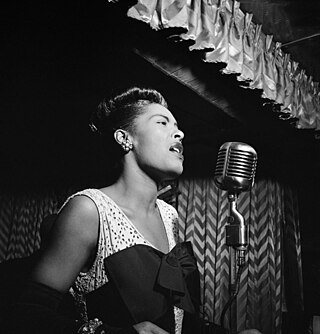External links
| | This blues song-related article is a stub. You can help Wikipedia by expanding it. |
| "Billie's Blues" | |
|---|---|
| Single by Billie Holiday | |
| A-side | "Summertime" |
| Released | 1936 |
| Recorded | July 10, 1936 [1] |
| Genre | Blues |
| Length | 2:37 |
| Label | Vocalion |
| Songwriter(s) | Billie Holiday |
| Producer(s) | Bernie Hanighen |
"Billie's Blues" is a blues song written by jazz singer Billie Holiday, composing it just before being recorded in a session on July 10, 1936. [1] According to the article in Melody Maker , on August 1, 1936:
"Billie Holiday has her first solo recording at Brunswick last week...Bernie Hanighen,...suggested making a blues, so the blues it was". This blues was Billie's Blues. [2]
Billie Holiday and Her Orchestra, (Bunny Berigan, trumpet; Artie Shaw, clarinet; Joe Bushkin, piano; Dick McDonough, guitar; Arthur "Pete" Peterson, bass; Cozy Cole, drums) [3]
Vladimir, Bogdanov. All Music Guide to the Blues: The Definitive Guide to the Blues, Backbeat Books (2003), p. 240, ISBN 0-87930-736-6

Billie Holiday was an American jazz and swing music singer. Nicknamed "Lady Day" by her friend and music partner, Lester Young, Holiday made a significant contribution to jazz music and pop singing. Her vocal style, strongly influenced by jazz instrumentalists, inspired a new way of manipulating phrasing and tempo. She was known for her vocal delivery and improvisational skills.

Barney Kessel was an American jazz guitarist. Known in particular for his knowledge of chords and inversions and chord-based melodies, he was a member of many prominent jazz groups as well as a "first call" guitarist for studio, film, and television recording sessions. Kessel was a member of the group of session musicians informally known as the Wrecking Crew.

Charles James Shavers was an American jazz trumpeter who played with Dizzy Gillespie, Nat King Cole, Roy Eldridge, Johnny Dodds, Jimmie Noone, Sidney Bechet, Midge Williams, Tommy Dorsey, and Billie Holiday. He was also an arranger and composer, and one of his compositions, "Undecided", is a jazz standard.

Margrethe Blossom Dearie was an American jazz singer and pianist. She had a recognizably light and girlish voice. Dearie performed regular engagements in London and New York City over many years and collaborated with many musicians, including Johnny Mercer, Miles Davis, Jack Segal, Johnny Mandel, Duncan Lamont, Bob Dorough, Dave Frishberg, and Jay Berliner.
"Summertime" is an aria composed in 1934 by George Gershwin for the 1935 opera Porgy and Bess. The lyrics are by DuBose Heyward, the author of the novel Porgy on which the opera was based, and Ira Gershwin.

Lester Willis Young, nicknamed "Pres" or "Prez", was an American jazz tenor saxophonist and occasional clarinetist.

David Lee Frishberg was an American jazz pianist, vocalist, composer, and lyricist. His songs have been performed by Blossom Dearie, Rosemary Clooney, Shirley Horn, Anita O'Day, Michael Feinstein, Irene Kral, Diana Krall, Rebecca Kilgore, Stacey Kent, Bette Midler, John Pizzarelli, Jessica Molaskey, and Mel Tormé.
"April in Paris" is a popular song composed by Vernon Duke with lyrics by Yip Harburg in 1932 for the Broadway musical Walk a Little Faster. The original 1933 hit was performed by Freddy Martin, and the 1952 remake was by the Sauter-Finegan Orchestra, whose version made the Cashbox Top 50. Composer Alec Wilder writes, "There are no two ways about it: this is a perfect theater song. If that sounds too reverent, then I'll reduce the praise to 'perfectly wonderful,' or else say that if it's not perfect, show me why it isn't."

Bernard D. Hanighen was an American songwriter and record producer best known for "When a Woman Loves a Man" and writing lyrics to the jazz composition "'Round Midnight" which was composed by jazz musician Thelonious Monk. Hanighen also worked with Clarence Williams and Johnny Mercer.

Mary Coughlan is an Irish singer.

Blossom Dearie is an album by Blossom Dearie that was recorded in 1956 and released in 1957. It was her first recording for Verve.

Once Upon a Summertime is an album by Blossom Dearie. It was released in 1959 by Verve Records.
"I Hear Music" is a popular song composed by Burton Lane, with lyrics by Frank Loesser for the Paramount Pictures movie Dancing on a Dime (1940). In the film it was performed by Robert Paige, Peter Lind Hayes, Frank Jenks and Eddie Quillan.
"What a Little Moonlight Can Do" is a popular song written by Harry M. Woods in 1934. In 1934, Woods moved to London for three years where he worked for the British film studio Gaumont British, contributing material to several films, one of which was Road House (1934). The song was sung in the film by Violet Lorraine and included an introductory verse, not heard in the version later recorded by Billie Holiday in 1935.
"I Can't Get Started", also known as "I Can't Get Started with You" or "I Can't Get Started (With You)", is a popular song. It was written in 1936 by Vernon Duke (music) and Ira Gershwin (lyrics) and introduced that year in the revue Ziegfeld Follies of 1936, where it was performed by Bob Hope and Eve Arden.
"(In My) Solitude" is a 1934 composition by Duke Ellington, with lyrics by Eddie DeLange and Irving Mills. It has been recorded numerous times and is considered a jazz standard.
"Don't Explain" is a song written by jazz singer Billie Holiday and Arthur Herzog Jr. It was Billie Holiday’s final song.

Lady Sings the Blues is an album by American jazz vocalist Billie Holiday released in December 1956. It was Holiday's last album released on Clef Records; the following year, the label would be absorbed by Verve Records. Lady Sings the Blues was taken from sessions taped during 1954 and 1956. It was released simultaneously with her ghostwritten autobiography of the same name.
Women in jazz have contributed throughout the many eras of jazz history, both as performers and as composers, songwriters and bandleaders. While women such as Billie Holiday and Ella Fitzgerald were famous for their jazz singing, women have achieved much less recognition for their contributions as composers, bandleaders and instrumental performers. Other notable jazz women include piano player Lil Hardin Armstrong and jazz songwriters Irene Higginbotham and Dorothy Fields.

The discography of Billie Holiday, an American jazz singer, consists of 12 studio albums, three live albums, 24 compilations, six box sets, and 38 singles.